Change
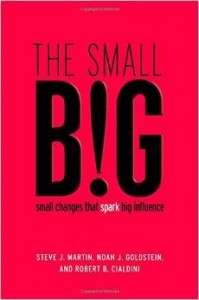 Ron’s Short Review: The concept is that doing small things can lead to big results. But what a slog. I don’t often give up on books but after reading for days and getting to chapter 10 which was only 20% of the way through the book, I gave up and read three other books in a few days. I think there are good nuggets and I’ll get back to it but can’t complete it now.
Ron’s Short Review: The concept is that doing small things can lead to big results. But what a slog. I don’t often give up on books but after reading for days and getting to chapter 10 which was only 20% of the way through the book, I gave up and read three other books in a few days. I think there are good nuggets and I’ll get back to it but can’t complete it now.
In a humble state, you learn better. I can’t find anything else very exciting about humility, but at least there’s that.
—John Dooner, Chairman and CEO of Interpublic, as quoted in Fast Company magazine, November 2001
The pathway to greatness as a leader begins, ironically, with a step down. We have seen this over and over. It’s not the loud, take-control, arrogant, hotshot “world beaters” who excel as leaders over the long term. No, the really great ones don’t draw that much attention to themselves. They are, well, humble.
To many people, humility seems like a vice, weakness, or disease to avoid at all costs. Isn’t a humble person a wimp or, worse, a cringing and despicable coward? Won’t a humble leader be the object of contempt and abuse, the kind of person who gets trampled by all the aggressive ladder climbers in an organization?
This perception may have seemed accurate in the past, but not any longer. Jim Collins, author of the business book megaseller Good to Great: Why Some Companies Make the Leap…And Others Don’t, has this to say:
Level 5 leaders [individuals who blend extreme personal humility with intense professional will] channel their ego needs away from themselves and into the larger goal of building a great company. It’s not that Level 5 leaders have no ego or self-interest. Indeed, they are incredibly ambitious—but their ambition is first and foremost for the institution, not themselves.
Sounds a lot like humility, doesn’t it?
Humility requires leaders to shed all their prejudices and biases. Humility requires you as a leader to examine who you are and what you have become. Humility requires a completely new way to evaluate people (and yourself). Just because individuals have made it to a higher position on the corporate ladder does not make them any smarter, any more correct in their decisions, or any more valuable than others within an organization. True humility leads to openness, teachability, and flexibility.
Much of the business world still believes that the take-charge, proud hero-leader is the answer to every company’s prayers for a robust bottom line. This thinking may have made sense at one time, but no longer, as some of the world’s largest companies have stumbled in shame under leadership styles that will never be described as humble.
So, can’t an aggressive leader be effective? Of course. However, studies show when an aggressive leader (one lacking in humility) tries to force his or her own ideas on others, the rate of success is not as high as when the leader is open to new ideas and willing to listen, bend, change, and seek commitment from his or her people.
Pride focuses the attention of leaders onto themselves; humility focuses the attention of leaders onto others. The proud leader wants success that brings him perks. The humble leader wants success that brings enduring health to others and the organization. Which leader would you want to work for? Which one would you trust?
Humble leaders may not lead cheers for themselves, but neither are they retiring and shy people. These men and women stand firmly for their core beliefs and values. When you watch them work, their performance is graceful and smooth. They are a joy to talk to because they give no indication that they are an ounce more important than you are. Oh, and one more critical detail: These humble leaders produce incredible results.
Of course, there is more to being a trusted leader than having a humble attitude. There’s a bad-news/good-news aspect to the quality of humility. The bad news is that, to be honest, I have encountered only a few truly humble leaders. If they were an animal species, they would definitely be on the endangered list. The good news is that, if you will learn how to humble yourself, the upside for you and your organization will be substantial. There isn’t that much competition.
The path to greatness begins with a step down to humility.
I’m sure you have worked for both type of leaders. Tell us how you react to each in terms of your trust and your productivity/engagement.
I’ve learned this concept from Chris McGoff. In his book, The Primes: How Any Group Can Solve Any Problem, Chris lays out numerous frameworks on how teams work. One of the most powerful for me and many of my teams is understanding the meaning of the word “Decide.”
I’m not trying to be morbid here, but what do the following words have in common?: pesticide, homicide, suicide, genocide? They all end in “cide.” In Latin, the word means kill, killer, murderer, to cause death. One of my clients who was a Latin student said there was even an indication of public execution—to put to death publicly.
So, if we go back to our word decide, it doesn’t mean to figure out what to do, it means to figure out what to kill.
If leaders and teams would actually start killing off the options or directions they’ve decided not to pursue, a great amount of resources could be saved and redirected toward the chosen path.
When you must decide, figure out what you’re going to kill and publicly execute it.
All too often, we decide what we’re going to do and we muster the resources to pursue that option. But no one tells the many people down through the organization what to stop doing. And in fact, there’s lots of momentum in the life of the organization for people to continue doing what they’ve been doing over the last several months or years. If you don’t publicly execute that work, they’ll naturally continue to do it.
As I was working through this concept with one of my clients, one team member said, “But we’re really good at prioritizing our work.” And she was right. The organization was really good at knowing which issues should receive top priority and the most resources. But as we continued to pursue the concept, it became painfully obvious how many resources were being applied to extremely low priority items. In fact, by deciding to kill off those low priority items it was astounding how many resources would be freed up to concentrate on the things that really need to be accomplished.
When faced with a team or leadership decision, decide what to kill and then publicly execute it and you’ll be amazed at how many more resources you have available to pursue the path of success.
Why do we have such a hard time killing off projects, initiative, lines of work or almost anything that people have been dedicating their time to? I can think of several reasons but what’s your experience? Share with us.
 Ron’s Short Review: Disorder and change are the times we live in. This books helps in dealing with this new reality. This and a couple of other books like “Predictably Irrational” remind us that the world is not really the logical, orderly world that we assume (or desire) and we need to learn how to function well in an irrational, disordered world.
Ron’s Short Review: Disorder and change are the times we live in. This books helps in dealing with this new reality. This and a couple of other books like “Predictably Irrational” remind us that the world is not really the logical, orderly world that we assume (or desire) and we need to learn how to function well in an irrational, disordered world.


 Ron’s Short Review: This is actually a collections of articles that the Heath’s wrote for Fast Company but it’s a great collection of the myths in business that keep us from simply doing the hard work it takes to succeed. Quick read but nicely thought provoking.
Ron’s Short Review: This is actually a collections of articles that the Heath’s wrote for Fast Company but it’s a great collection of the myths in business that keep us from simply doing the hard work it takes to succeed. Quick read but nicely thought provoking.
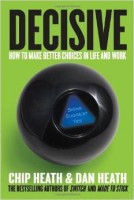
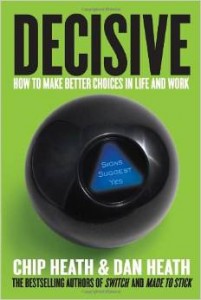 Ron’s Short Review: These guys have a great writing style and cover great topics. Here they cover the 4 villains of decision making and how to overcome them.
Ron’s Short Review: These guys have a great writing style and cover great topics. Here they cover the 4 villains of decision making and how to overcome them.
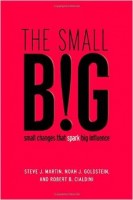





 Ron’s Short Review: Great little motivational book for dealing with the fears of resistance and just doing the work that you were meant to do.
Ron’s Short Review: Great little motivational book for dealing with the fears of resistance and just doing the work that you were meant to do.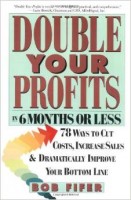
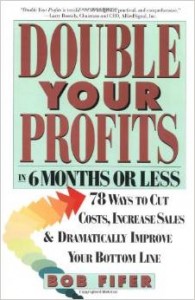 Ron’s Short Review: 1. Be the best. 2. Be a meritocracy. 3. We’re here to make a profit. I’m not sure I agree with all of his 78 recommendations but many of them are provocative.
Ron’s Short Review: 1. Be the best. 2. Be a meritocracy. 3. We’re here to make a profit. I’m not sure I agree with all of his 78 recommendations but many of them are provocative.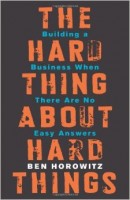
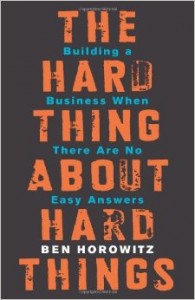 Ron’s Short Review: Good advice written for the CEO’s of start-ups but it really applies to leadership at any level.
Ron’s Short Review: Good advice written for the CEO’s of start-ups but it really applies to leadership at any level.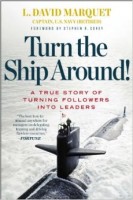
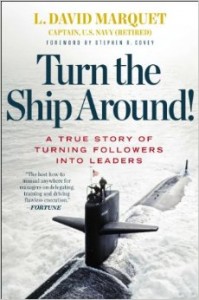 Ron’s Short Review: When I read this book I thought I only got one point. Then I heard Marquet speak and he said “There is only one point to the book.” That made me feel better and honestly, it is one powerful point.
Ron’s Short Review: When I read this book I thought I only got one point. Then I heard Marquet speak and he said “There is only one point to the book.” That made me feel better and honestly, it is one powerful point.
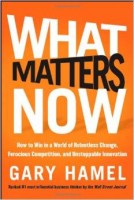
 Ron’s Short Review: Great follow-up book to Daniel Pink’s “Whole New Mind”. Now that the world is in a state of perpetual change, how do you lead?
Ron’s Short Review: Great follow-up book to Daniel Pink’s “Whole New Mind”. Now that the world is in a state of perpetual change, how do you lead?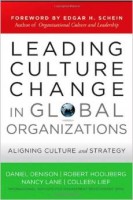
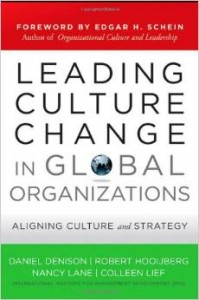 Ron’s Short Review: Denison’s culture survey is still the only one that I know of that relates culture to bottom-line performance. More examples from companies around the world.
Ron’s Short Review: Denison’s culture survey is still the only one that I know of that relates culture to bottom-line performance. More examples from companies around the world.